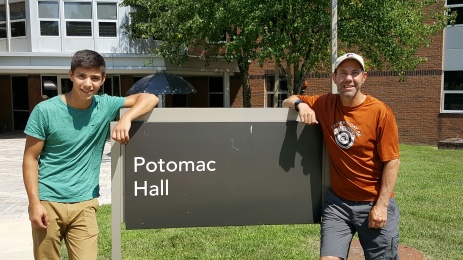Ode to a 33-Year Relationship that Ended Badly
She was a love of my life. We had 33 wonderful years together, from young adulthood well into midlife. But in the end, she got old, and her body, especially the most important parts, just wore out. Things loosened and sagged. Her usual sharp edges dulled. Midlife is unforgiving in that way. And she hurt me, cut me like a knife. I’m still scarred from our relationship.
Ultimately, I just had to let her go. Our relationship had been broken; she was damaged goods and couldn’t be fixed without making wholesale changes. I wish I could say I let her go gently, but that would be a lie. I discarded her like a piece of junk on a scrap heap, and never looked back. I knew she could easily be replaced with a better version that would make me feel safer, happier and livelier, maybe even younger, and eliminate my doubts and anxiety.
Though the ending was brutal, particularly for her, that should in no way invalidate the great times and adventures we enjoyed together, where we essentially operated as one finely-tuned unit.
We first got acquainted as college sweethearts, as I was entering my senior year. We got familiar with each other during those innocent times, spending weekends together in the idyllic small towns, rolling hills and farms of Upstate New York.
Over the next decade, she was a constant companion. We would travel together through the Montana and Canadian Rockies, sleeping under the stars and a light August snowfall; down the rugged Washington and Oregon coasts; amid tropical Florida barrier islands and quaint Vermont towns; and on long, carefree journeys through the Shenandoah, Blue Ridge and Great Smoky Mountains. We enjoyed history together as well, touring the Gettysburg battlefields. We even competed together in triathlons, when she was in better shape than this last, disheartening year.
At home, she was always a loyal, steady and reliable partner. She was always there to pick me up, ready to go when I needed to escape for a while, to clear my head, seek a change of scenery or just relax and re-energize. For decades, I counted on her and returned her loyalty, even as I saw my contemporaries trade in their mates for younger, sleeker models. I admit to having envy, but I stuck by mine, perhaps stubbornly for too long.
Alas, all good things do come to an end. My longtime companion started giving me trouble last spring. Something was wrong with her, just wasn’t herself anymore. She became unreliable, nearly left me stranded a few times. Physically, she was breaking down, severely testing my patience. I took her to a specialist, and his prognosis was dire. The decline was irreversible without a major intervention.
Still, I decided to give her one more chance when others might have justifiably called it quits, taking her to Bethany Beach, DE with me for a summer 2017 of teaching tennis. We survived together for a while, but I was wary and it was touch-and-go whenever we spent time together. In short order, she let me down again. It was the last straw. I’d had enough. The relationship was irretrievably broken.
The grey Fuji Del Rey 12-speed touring bicycle that I had purchased for just more than $300 in 1984 had a drivetrain system that was worn and no longer functioning properly. The drive chain had become stretched and the gear teeth were dulled. If the pedal revolutions became too slow for the gear, the chain would detach from the gear teeth 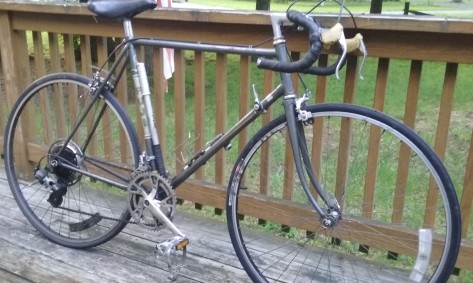 and the bike would become inoperable. Going up hills became an adventure, like in the movie Speed, where if the bus slowed to less than 50 mph a bomb on board would detonate. If I had to push too hard on the pedals, the chain would click…click…click…and fall off, leaving me on the side of the road trying to reattach the chain, hands blackened with grease.
and the bike would become inoperable. Going up hills became an adventure, like in the movie Speed, where if the bus slowed to less than 50 mph a bomb on board would detonate. If I had to push too hard on the pedals, the chain would click…click…click…and fall off, leaving me on the side of the road trying to reattach the chain, hands blackened with grease.
The beach terrain is flat, so I thought I could milk one last summer out of my Fuji. On a backroads ride, I slowed too much for the gear I was in, and the chain detached. I reattached the chain, but apparently on the wrong gear ring. When I stepped on the pedal to start the wheels rolling, the chain detached and my leg crashed down onto the
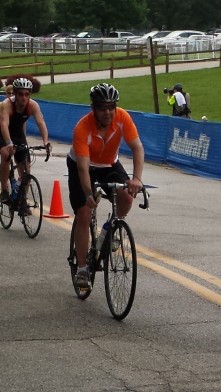
The pair in happier times
gear teeth, leaving me with six cuts running up my right leg, a perfect imprint of the gear ring. I managed to reattach the chain correctly and ride another five miles home without incident, but bloodied. Months later, I still have the scars.
That was our last ride together, me and my ancient Fuji. I brought it home on a one-day trip back to Maryland and left it, where my wife unceremoniously placed it on the curb for trash pickup. I don’t know if a trash hauler saved her for a new life or crunched it into mangled metal. Either way, I didn’t care anymore. We had a past together, but I was over her. Me and Fuji, we were just so…yesterday.

 burying the hurt, anger, disappointment, sadness or other negative emotions until one day they boil over and surface in a torrent, providing release for the emotional-baggage carrier and a knockdown punch for the recipient of the pent-up emotions, unaware of the depth and intensity of feelings. I’ve been on both the unleashing and receiving ends of the bubbling emotional volcanos, and it’s never pretty.
burying the hurt, anger, disappointment, sadness or other negative emotions until one day they boil over and surface in a torrent, providing release for the emotional-baggage carrier and a knockdown punch for the recipient of the pent-up emotions, unaware of the depth and intensity of feelings. I’ve been on both the unleashing and receiving ends of the bubbling emotional volcanos, and it’s never pretty.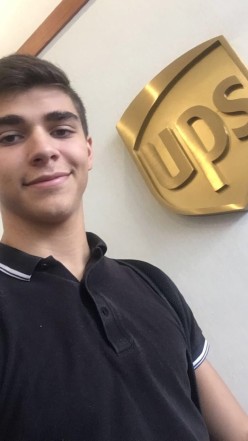 teamwork and communications that comprise effective work environments; play a role in his maturation; and help him build a financial nest egg before launch into the adult world, all while he is still a teenager. That’s what Brown can do for me – and my 19-year-old son Daniel.
teamwork and communications that comprise effective work environments; play a role in his maturation; and help him build a financial nest egg before launch into the adult world, all while he is still a teenager. That’s what Brown can do for me – and my 19-year-old son Daniel.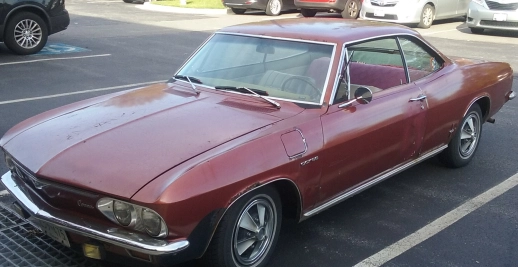 Pinto, Ford Maverick and Ford Mustang; the AMC Gremlin, AMC Pacer (introduced to later generations as the Wayne’s World car) and AMC Javelin; the Chevy Vega, Chevy Camaro and Chevy Nova; the Dodge Dart Swinger; the Opel Manta and the VW Karmann Ghia. I collected Matchbox cars as a kid – that may account for some of my fascination.
Pinto, Ford Maverick and Ford Mustang; the AMC Gremlin, AMC Pacer (introduced to later generations as the Wayne’s World car) and AMC Javelin; the Chevy Vega, Chevy Camaro and Chevy Nova; the Dodge Dart Swinger; the Opel Manta and the VW Karmann Ghia. I collected Matchbox cars as a kid – that may account for some of my fascination.